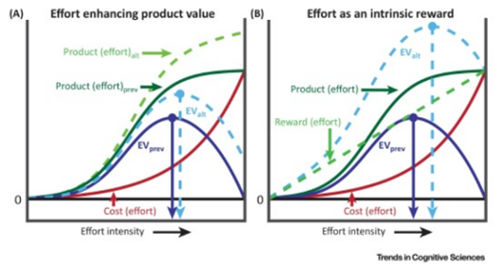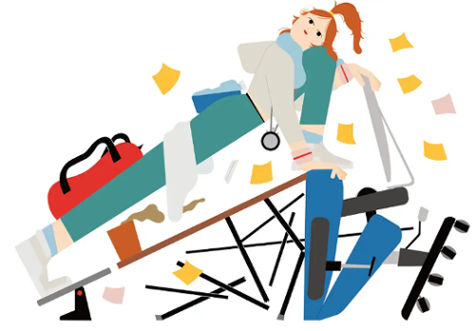What if our brains are wired to resist hard work, despite our best intentions? The Effort Paradox suggests that this is indeed the case.
INTRODUCTION
Procrastination is a pervasive problem that affects millions of people worldwide. We’ve all experienced it – staring blankly at a task, promising ourselves we’ll start “just tomorrow,” or scrolling mindlessly through social media to avoid the dreaded to-do list. But have you ever stopped to wonder why our brains seem to resist hard work, despite our best intentions?
The answer lies in the Effort Paradox, a phenomenon where our brains conserve energy by resisting effort. This intrinsic resistance leads to procrastination, a habit that can derail careers, damage relationships, and erode self-confidence. The Effort Paradox is a complex interplay of psychological, neurological, and cognitive factors that hinder our productivity and motivation.
This article will delve into the mechanisms driving the Effort Paradox, exploring cognitive biases, neurological factors, and practical strategies for overcoming resistance.
UNDERSTANDING THE EFFORT PARADOX
“On the one hand, the effort is costly,” says Michael Inzlicht, a psychologist at the University of Toronto, Canada. “On the other hand, it looks like we tend to value those things that we exerted effort for.” In a seminal 2018 paper, he and his colleagues dubbed this apparent conflict the “effort paradox”.
The Effort Paradox highlights a fundamental contradiction in human behavior, where our brains simultaneously resist and value hard work. On the one hand, the effort is inherently aversive, triggering avoidance and procrastination.
THE BRAIN’S ENERGY CONSERVATION PRINCIPLE
Our brain is wired to conserve energy, prioritizing efficiency over effort. This principle, known as the “Law of Least Effort,” drives our brain to seek the path of least resistance and reveals that our brain prioritizes energy efficiency, often at the expense of effort and productivity.
This fundamental drive to conserve energy and maintain homeostasis influences our behavior, leading to procrastination, mental fatigue, and decreased motivation.
The brain’s energy conservation mechanism involves neural mechanisms such as dopamine regulation, cortical activity, and neurotransmitter balance. Dopamine release influences motivation and energy allocation, while brain regions like the prefrontal cortex and basal ganglia regulate effort and energy.
Additionally, neurotransmitters like serotonin and acetylcholine modulate energy and motivation. Recognizing these underlying processes enables us to develop targeted strategies to enhance productivity and well-being.

COGNITIVE BIASES: BRAIN’S EXCUSE FOR AVOIDANCE
Cognitive biases are systematic patterns of thinking that influence our perception, decision-making, and behavior. Often, these biases serve as the brain’s excuses for avoidance, perpetuating procrastination and resistance to effort.
Biases Leading to Avoidance:
- Present Bias: Prioritizing short-term gains over long-term benefits.
- Loss Aversion: Fear of loss outweighs potential gains.
- Time Inconsistency: Valuing immediate gratification over future rewards.
- Effort Justification: Overvaluing past efforts to avoid new challenges.
- Sunk Cost Fallacy: Continuing investment due to past commitments.
- Fear of Failure: Avoiding challenges due to fear of unsuccessful outcomes.
- Perfectionism: Delaying action due to unattainable standards.
- Task Aversion: Avoiding tasks due to perceived difficulty or discomfort.
ECONOMIC CONSEQUENCES
The Effort Paradox has significant economic implications, affecting individual productivity, organizational performance, and overall economic growth. Decreased productivity, opportunity costs, and talent misallocation are microeconomic consequences that arise from procrastination and avoidance. When individuals fail to exert effort, they underutilize their skills, leading to reduced productivity and lost revenue.
At a macroeconomic level, the Effort Paradox hampers economic expansion. Reduced aggregate productivity leads to decreased economic growth, inefficient resource allocation, and increased unemployment. As a result, the overall economy suffers from reduced innovation, stagnation, and decreased competitiveness.
Organizations also bear the brunt of the Effort Paradox. Decreased innovation, talent retention issues, and reduced competitiveness are consequences that can threaten an organization’s survival.
Individuals are also affected, facing career stagnation, reduced earnings, and decreased job satisfaction. By recognizing the Effort Paradox and addressing its underlying factors, individuals, organizations, and policymakers can work together to mitigate its economic consequences.
WANING ACADEMIA INTEREST
In today’s fast-paced, technology-driven world, students are constantly bombarded with distractions, making it easier to procrastinate and put off challenging academic tasks. The Effort Paradox has become a pervasive issue, leading to declining academic interest, poor performance, and decreased motivation.
Current Procrastination Trends
- Social media obsession: Endless scrolling on Instagram, TikTok, and Facebook.
- Streaming services: Binge-watching TV shows and movies on Netflix, Hulu, and YouTube.
- Gaming addiction: Hours spent playing video games on consoles, PCs, and mobile devices.
- Messaging apps: Constantly checking WhatsApp, Snapchat, and Messenger.
- Online browsing: Mindless surfing on Wikipedia, Reddit, and online forums.
- Poor academic performance: this creates a pressure in students’ minds that leads to a rise in suicide rates.
BREAKING THE PARADOX
To overcome the Effort Paradox, it’s essential to address the underlying psychological, neurological, and cognitive factors driving resistance. This can be achieved by reframing goals, breaking tasks into manageable steps, and implementing self-reward systems. By aligning tasks with intrinsic motivation and dividing them into smaller, achievable steps, individuals can build momentum and overcome initial resistance.
Emotional regulation also plays a crucial role in breaking the paradox. Mindfulness practices, such as meditation and deep breathing, can help mitigate stress and anxiety associated with effort.
Additionally, recognizing and challenging cognitive biases, like present bias and loss aversion, can prevent procrastination and rationalization. By cultivating self-awareness and self-compassion, individuals can develop a growth mindset, embracing challenges as opportunities for growth.
CONCLUSION
The Effort Paradox reveals a fundamental tension between our brain’s desire for comfort and our aspirations for success. By understanding the psychological, neurological, and cognitive factors driving this paradox, we can unlock new strategies for overcoming resistance and achieving our goals. Recognizing that effort is inherently aversive but can also be rewarding, we can reframe our mindset to view challenges as opportunities for growth.
By embracing the Effort Paradox, we can transform our relationship with hard work and unlock our full potential. This involves reframing goals, breaking tasks into manageable steps, implementing self-reward systems, and practicing mindfulness.
-SHEELU KUMARI
MUST READ: CENTRE RESITS CRIMINALIZING MARITAL RAPE, SAYS EXISTING LAWS ADEQUATE


